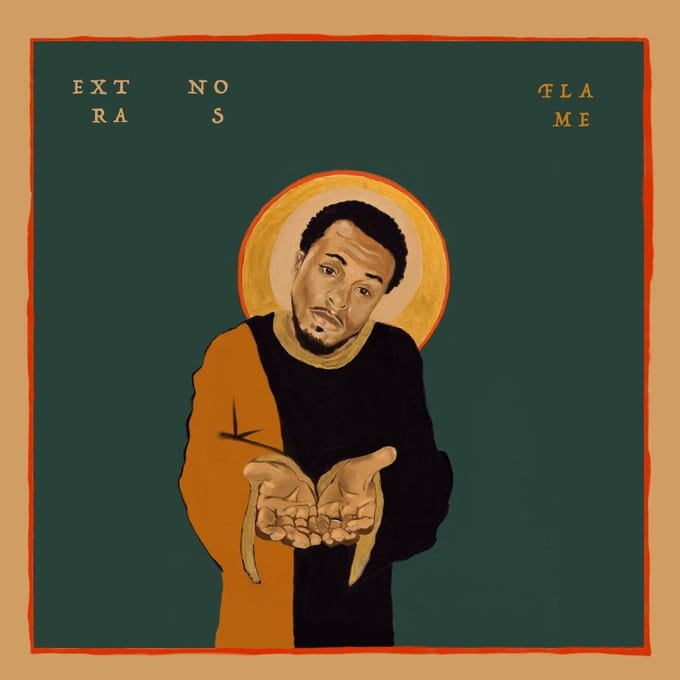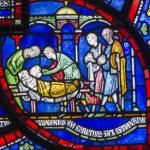Christian hip-hop artist Flame has announced that he has become a Lutheran and has made his new theology the topic of his latest recording.
Flame, whose real name is Marcus Gray, has been nominated for a Grammy and several Dove awards for contemporary Christian music. He was in the news recently for successfully suing pop star Katy Perry for plagiarism and winning a $3 million judgment. For more on his background–his troubled childhood, his turn to Christianity, his professional accomplishments, and his good works in his home town of St. Louis–read this.
He recently completed an M.A. (not the M.Div. of pastoral students) at Concordia Seminary in St. Louis, majoring in Systematic Theology, with minors in Church History and Counseling. He had been a Calvinist, just looking for a degree program, but at Concordia Seminary he found a theology that helped him work through issues he had been struggling with and that filled him with a sense of liberation and joy.
In a Twitter announcement about his 10th record release, Extra Nos, he wrote, “My first EP drops Friday! ‘extra nos’ discusses my theological journey over the past 4 years. My hope is that sharing these insights will bring you the Godly peace & freedom that I experienced.”
The ensuing thread reminded me that there are lots of black Lutherans. The African-American pastors I have met have all been confessional, liturgical, and faithful. The same goes for the laity. Check out on that thread the comments and the YouTube video of “St. Typo de Tyre,” who was kind enough to recommend my book Spirituality of the Cross.
Flame’s new release is an EP, an “extended play” recording, which is longer than a single but not quite as long as an album. The seven tracks are dense with Lutheran theology, explained in an affecting, personal way. The lyrics have been transcribed (not always accurately) and are posted at AZ Lyrics, but you really need to hear them. Go here to buy the EP or to listen to it on streaming services (some of which are free). I urge you to buy it, since I’m not sure how many of his fans in contemporary Christian music will stay with him in light of his new theology.
The first track, “Scattered Tulips,” shows rap music at its best, incorporating not just rhythm but also music and complex lyrics in intricate and catchy patterns. The title refers to the TULIP summary of Calvinism (Total depravity; Unconditional election, Limited atonement, Irresistible grace; Perseverence of the saints). He says how Calvinism had helped him get a bigger picture of God and to prioritize Scripture, but how he struggled with the problem of not knowing whether one is of the elect and the need to look within to find evidence of one’s salvation. In a later song, “Sola Fide,” he writes about a Christian in torment.
He’s been saved now for how long and he’s still struggling with the same flaws
And then you prescribe he scuba dive in that same heart
That sin-filled, hope killed, broken willed and super dark
You don’t send that person inside himself
You remind that saint that it’s extra nos (Outside himself)
Instead of looking inward, scrutinizing the state of one’s self, Christians should look for their assurance outside themselves (“extra nos”), to the Cross of Jesus Christ, to God’s Word, to the Sacraments, to Christ’s promises in the Gospel.
Flame says that Lutheranism was particularly helpful in what it taught him about justification. But he has also come to understand the Christian life, particularly vocation. In “Good Works,” which is more straight teaching than a rap, as such, he marvels at Luther’s emphasis on loving and serving our neighbors:
Man I love how Luther emphasized that God doesn’t need our good works
But our neighbor does
I mean that’s so weighty when you think about it because all our good deeds
Our sanctification, our skill-sets, our responsibilities, and various roles
Are for the benefit of those around us
Our families, society, our neighbor, right?
But what makes us right with God, Paul says, is our faith
That’s how we are made righteous
And how we remain righteous, in Christ
Some evangelicals glom onto Lutheranism, with its liberating understanding of the Gospel, as an excuse for antinomianism, but Flame is sensitive to the ethical consequences of justification. He celebrates the Third Use of the Law. In “I Used to Think Like That,” he gives a shoutout to one of his Concordia professors, Dr. Joel Biermann, an ethicist, “who was unapologetically Lutheran (Aye he went hard),” for his influence. One of the tracks is entitled “2KR,” which explores the Lutheran notion of the 2 Kinds of Righteousness. Our righteousness before God (Coram Deo), is passive, coming completely from Christ. Our righteousness before the world (Coram mundo–Flame loves all of these Latin descriptors) is active vocationally in our love and service to our neighbors, or, as Flame puts it, “serving, loving, healing, and building one another up (Go).”
“Used to Think” is a lively rap contrasting with what he used to believe as a Calvinist and what he believes now as a Lutheran.
I used to think like
That bread and wine were elements that represent
I do not think like that
This is my body and blood
He said what He meant
I used to, I used to, I used to, think
Jesus’s death wasn’t for all
It was sufficient for all
It contains lots of good lines: “When I was a Calvinist/ Everything was ’bout an idol, we made an idol out of not making idols.” Whereas Luther taught him about “Serving your neighbor, enjoying creation.” He also says that he used to think that “the only options were Calvinist-Arminian,” something he treats in several of the tracks, that he had never heard of the Lutheran option (which should be an indictment for us Lutherans for not getting the word out beyond our insular circles).
In “Concordia,” which is not so much a rap as a conversation, he tells about how God brought him to Concordia seminary and taught him just what he needed. Flame sums that up in “Ordo Salutis” (Order of Salvation–again, he really likes the Latin):
Faith is a gift
I’ve been baptized
I meet Him at the altar in the bread and the wine
It’s more than a sign
That’s why it’s emphasized
That since Christ died
Only faith justifies
Again, you’ve got to hear these raps, even if rap isn’t exactly your kind of music. You can do that here or here.
Also, Rev. Trevor Sutton, my co-writer on Authentic Christianity: How Lutheran Theology Speaks to a Postmodern World, has written about Flame/Marcus Gray and Extra Nos in the context of Kanye West’s newfound Christianity and other conversion narratives in rap music. His article is entitled Hip Hop and Christian Conversion Narratives: What do Kanye and Hip Hop have to do with Augustine of Hippo? Quite a bit, it turns out.
Illustration: Cover of Extra Nos.
HT: Joanna, Paul McCain













